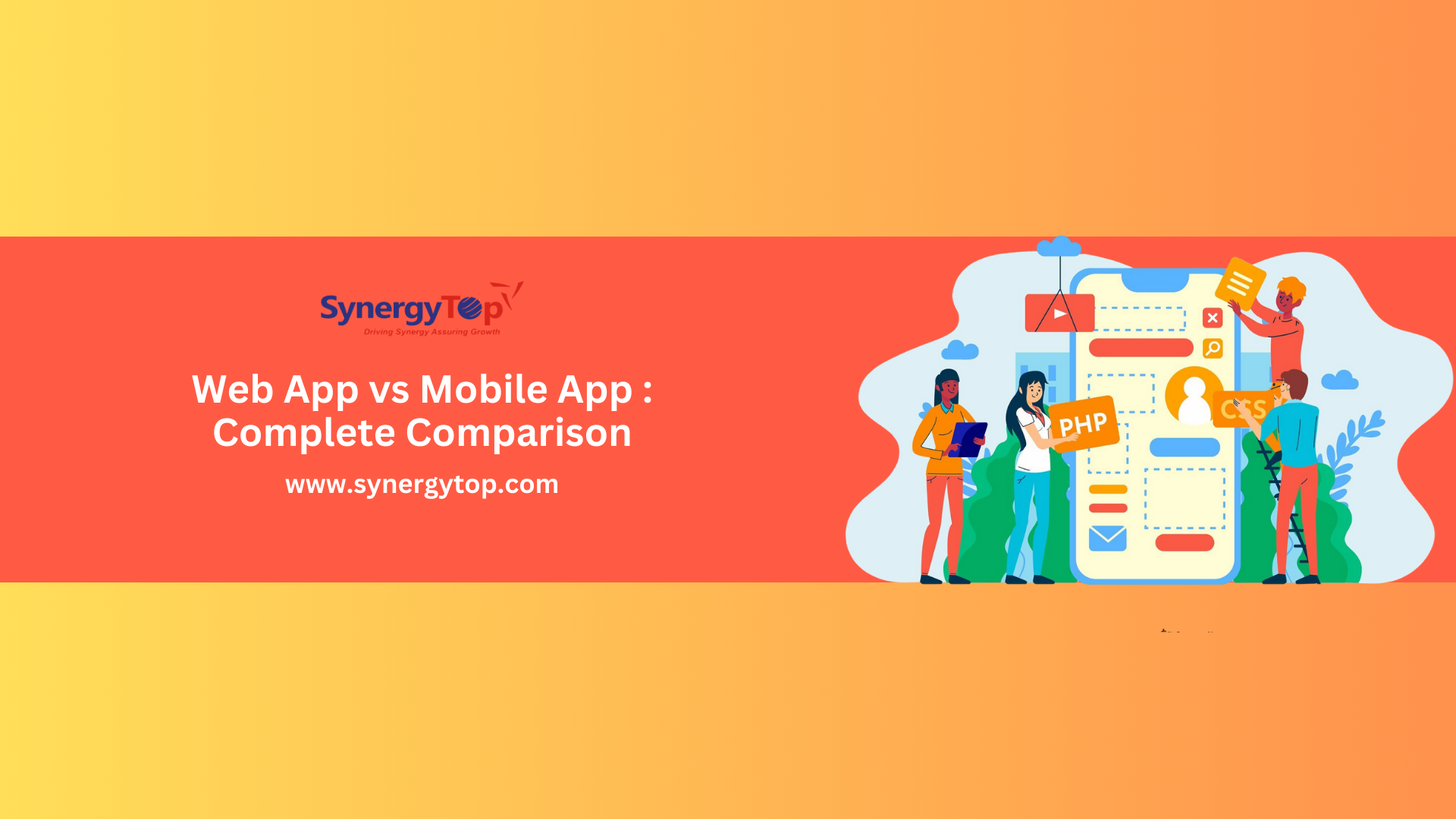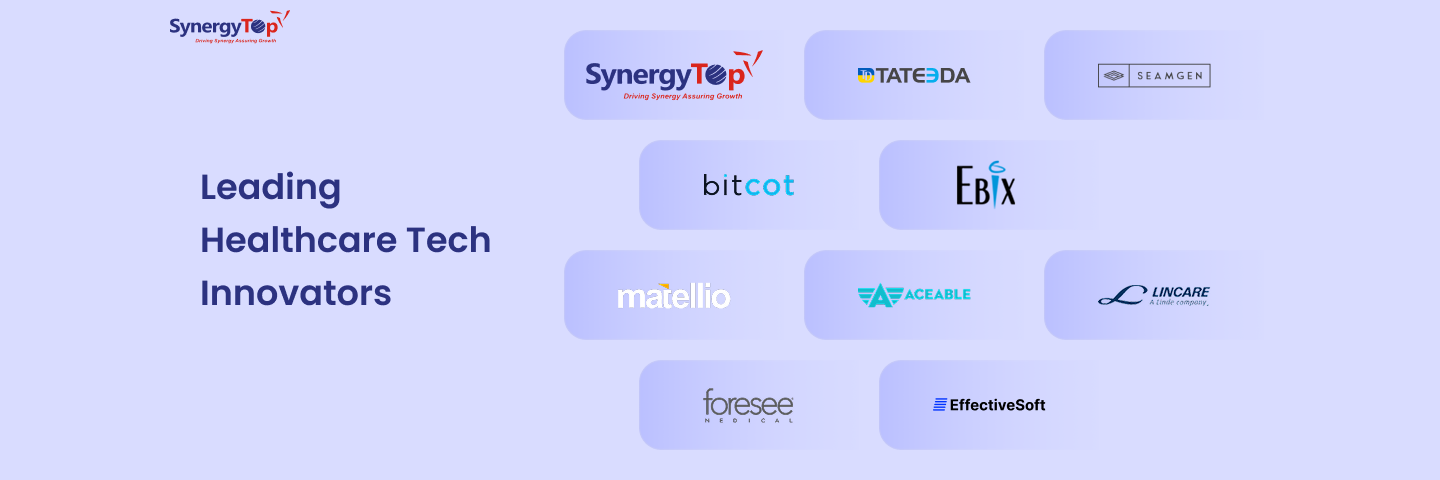When you are working with Oracle Commerce, you can either choose to keep it on-premise or go on-cloud, much like many other software solutions.
Oracle introduced the cloud version of the Oracle Commerce platform to customers in 2015. This Oracle Commerce Cloud has given a path to the existing on-premise commerce Customers to move their applications to the cloud.
As it is just an upgrade and not a platform change no major features are lost/impacted during the migration process. However, customers are not confident enough to touch their already set-up eCommerce application. There seem to be genuine concerns with this enterprise paradigm shift and the impact it will have on their business. These concerns need to be addressed as part of modernizing the Oracle Commerce on-premise solution and moving it to the cloud.
Being an Oracle partner and a preferred e-commerce solution provider, SynergyTop would like to address these concerns and nullify the risk of upgrading from Oracle Commerce to Oracle Commerce Cloud.
Migration to OCC
Functionality and lower TCO (Total Cost of Ownership) are two primary factors that drive the migration decision from on-premise Oracle Commerce (ATG) to Oracle Commerce Cloud (OCC). This migration offers an improved customer experience and backend processes with operational efficiencies and DevOps.
Concerns of existing on-premise customers
- ATG on-premise implementations are packed with a lot of customizations over the years and moving all these things to the cloud is a big concern.
- A lot of investment is already done in the implementation and enterprise integrations of e-commerce applications. Few of the customers have recently upgraded their applications to Oracle Commerce 11.2 or 11.3 versions. Moving to the cloud adds additional cost to the customers.
- OCC version upgrades – Is it really necessary to upgrade the OCC version every 3 months? Can customers skip it and only upgrade to the critical versions?
- Build and deployments – What would be the frequency of builds and deployments? Would it also be controlled by Oracle? Should it be done along with the OCC version upgrade?
- Maintenance costs will be enhanced.
- Limited documentation is an additional factor that makes the customer worry about it.
These are valid business and technical concerns. And these can be easily and efficiently addressed by availing reliable technical solutions, like migration services by SynergyTop.
What benefits does OCC offer?
As mentioned earlier, this is not a change in the platform but only an upgrade from on-premise to the cloud. The foundation of OCC is still running both ATG and Endeca in the background. Oracle has come up with a commerce cloud bundled with a true API-first SaaS solution to provide Oracle Commerce as a service with modern architecture and all the benefits gained when treating the commerce platform as a service rather than using it traditionally.
But as we already know, every new thing has something better than its previous counterpart. And OCC is also more advanced and technically sound to offer.
Oracle Commerce Cloud offers –
- Almost all of the e-commerce features
- Flexibility with OOTB and custom integrations
- Robustness
- Supports Omni-channel
- Improved user experience
- Improved page performance
- Scalability and the availability of the SaaS platform
- Updates every 3 months (optional until a critical upgrade)
- Increased conversion rate and many more
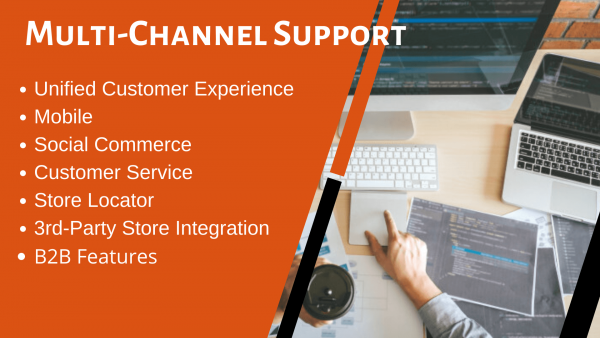
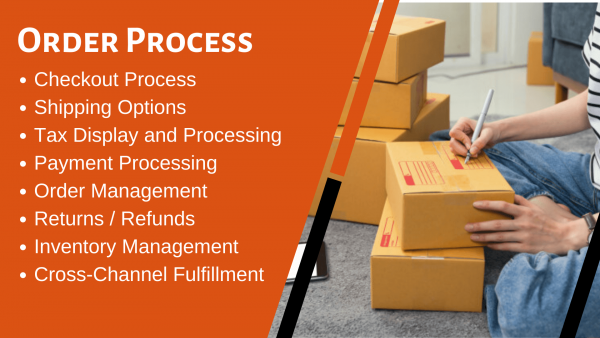

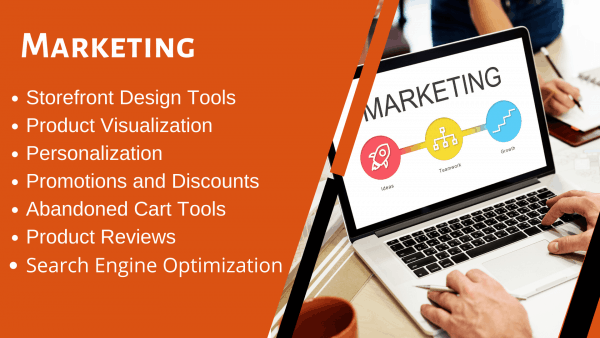
Oracle Commerce Cloud Features
Key benefits of migrating to OCC –
- Quicker time to Market – Most of the heavy lifting on required functionality is done by the platform itself, which means very less time is required to market.
- Flexibility – Oracle Commerce Cloud provides flexibility in terms of architecture from API-first to headless. It decouples the back-end services from the front-end UI, which provides the flexibility to use the best-in-class frameworks based on the client’s preference.
- Responsiveness to the business needs
- The time to purchase, configure and install the server has been reduced from months or weeks to a few minutes
- OCC automatically provides upgrades quarterly hence it has become simpler compared to on-premise.
- Features provided in OCC are even more robust than in on-premise applications.
- Many features like AB testing, recommendations, and AI are already pre-integrated in OCC’s single subscription. Along with this, OCC provides full REST API coverage, OOTB integrates with other CX products in place, whereas it needs a custom build in an on-premise environment.
- Development requirement in OCC is much less as compared to on-premise applications and this reduces the costs enormously. Most of the backend development is streamlined, enabling developers to focus more on the frontend experience. OCC exposes much more of the back-end functionality through the admin configuration, which in ATG, has to be coded from scratch.
- OCC comes pre-integrated with numerous 3rd-party applications (e.g., payment, tax, etc.) that can be easily configured from the admin console.
- You can be assured when it comes to security and need not worry about investing in security compliance. OCC has already invested enough to provide the most secure cloud infrastructure to the customer. These strict security measures are baked into all Oracle Cloud products and are implicitly available to all Oracle Cloud customers, so instead of managing PCI, GDPR, or whatever comes next, customers can rest assured that Oracle is handling it.
- Oracle takes ownership of infrastructure in the commerce cloud. And you need not worry about infrastructure maintenance schedules, resources, and cost involved in it. Oracle takes ownership of infrastructure in the commerce cloud.
- OCC Maintenance cost is pretty small compared to On-Premise solution maintenance and support.
- OCC provides ultimate control and agility for business users.
- OCC provides support for B2C and B2B in a single platform and single toolset.
What should be my OCC Migration Planning & Strategy?
Preparing for OCC:
- Treat the migration to OCC as an upgrade – Many Oracle Commerce customers have invested millions of dollars that are not fully amortized. Treating this as an upgrade allows the company to treat future investments in Oracle Commerce Cloud as an extension of previous investments in Oracle Commerce.
- All the business requirements should be documented. We, at SynergyTop, provide documentation for each and every aspect of Oracle Commerce Cloud implementation.
- Analyze and compare, what you have in hand and what OCC is offering.
- Break down the features in the existing e-commerce application and try to map them with the OCC features. Take our expert advice to know more about new features in OCC. This provides a broad look at how much customization, if any, will be required.
- Note that excluding a feature is not leaving that feature behind but putting a step forward to a new way of customizing it in the commerce cloud. Many applications are carrying many legacy features along with version upgrades. An expert like us can help you to make your way out of it.
- Design your architecture for longer terms and to be scalable even if you are a small player.
- Understand the version upgrades, build, and deployment process in OCC.
- Get to know about version upgrade frequency, the process to build the code, and deploy it to the non-production and production environments
Steps for OCC Migration
- Analysis of Oracle commerce code base
- In this step, the entire commerce code will be scanned and a report will be generated. This report will talk about the OOTB and custom components in the codebase.
- This analysis will also help to identify modules and their dependency on other modules.
- It identifies all 3rd party software modules that exist in the current commerce application.
- Custom repository analysis will give important information regarding the customizations done and will help to understand the readiness to move to the commerce cloud.
- Review reports generated in the 1st step
- All the reports generated in the first level of analysis should be reviewed by experts and technical architects. This helps in taking a quick and correct decision.
- Together they can review the customizations done in the current state and can compare the custom features against commerce cloud features.
- Based on the above 2 steps, they can decide on what features to migrate or exclude.
- Migrate repositories and configurations
This step is to move all key repositories and custom data structures into OCC.
- Create a profile, catalogue, promotions, order and price related extensions specific to the Oracle Commerce Cloud repository.
- Migrate all Endeca configurations such as the thesaurus, keyword redirects, dictionary etc into the Oracle Commerce Cloud.
- Migrate all multisite related configurations.
- Migrate repository data into cloud repositories to the respective domain.
- Business-to-Business (B2B) specific features will also be identified and migrated to the cloud.
- Validate Configurations migrated to OCC
In the last step, all the configurations, components, repositories and data need to be validated in Oracle Commerce Cloud. SynergyTop experts can assist you in performing these steps through Oracle Commerce Cloud’s Admin Console and also are experts in data cleansing and migration.
SynergyTop offers a Cloud Readiness Assessment to review different aspects of a client’s technology ecosystem and how their IT team is organized. This Assessment includes a feature-to-feature mapping and an ATG to OCC data migration toolkit for the product, pricing, inventory, and customer data. Our experience is that customers are either ready, or we provide them with the services and information that they need to be ready.
Write to us at contact@synergytop.com to know more about how you can leverage your oracle commerce cloud E-commerce platform.






